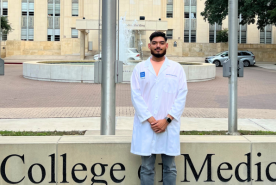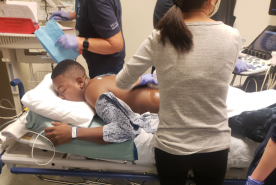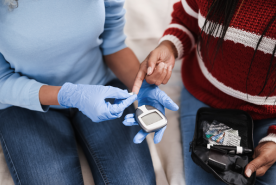Last Updated: February 08, 2024
Medically reviewed by NKF Patient Education Team
About APOL1-Mediated Kidney Disease (AMKD)
AMKD is a type of kidney disease caused by variants (changes) in the APOL1 (apolipoprotein L1) gene. Certain APOL1 variants have been linked with different types of kidney disease, including a higher risk of high blood pressure-related chronic kidney disease (CKD) or kidney failure, focal segmental glomerulosclerosis (FSGS), and HIV-associated nephropathy (HIVAN). Variants linked with disease are known as risk variants, such as APOL1 risk variants.
Certain APOL1 risk variants have been linked with a higher risk of kidney disease in people of Western and Central African descent. Other factors can also increase kidney disease risk.
Signs and symptoms
Many people living with AMKD do not have any symptoms until the more advanced stages of kidney disease and/or complications develop. Also, the symptoms you may have will depend on the type of kidney disease present.
Symptoms related to CKD may include:
- Foamy urine
- Urinating (peeing) more often or less often than usual
- Itchy and/or dry skin
- Feeling tired
- Nausea
- Loss of appetite
- Weight loss without trying to lose weight
Symptoms related to FSGS or HIVAN can include:
- Swelling in your legs, ankles and/or around your eyes (called edema)
- Weight gain due to extra fluid (water) build-up in your body
- Foamy urine
- High cholesterol (fat) levels in the blood
- Low levels of albumin (protein) in the blood
Causes
We each inherit two copies of the APOL1 gene, one from our mother and one from our father. The gene codes (or contains instructions) for making a protein involved in the immune system.
It is believed that APOL1 variants arose as protection from certain parasites in Western and Central Africa thousands of years ago, but some variants can also raise the risk of kidney disease. A similar example are variants related to the sickle cell trait and sickle cell disease; these variants protect from malarial infection.
People more likely to have an APOL1 risk variant can include people who identify as Black/African American, Afro-Caribbean, and/or Hispanic/Latino. People with two copies of an APOL1 risk variant have about a 15-20% chance of developing kidney disease in their lifetime. About 80% of people with two copies of an APOL1 risk variant do not get kidney disease. Therefore, not everyone with two copies of an APOL1 risk variant will get kidney disease. Also, people without APOL1 risk variants can still get other types of kidney disease.
Kidney disease can be a result of multiple physical, environmental, and social factors.
APOL1
Sign up for a deep dive into APOL1
Learn about APOL1, receive additional resources, and learn so much more.
Complications
AMKD can lead to other health problems or complications. AMKD can lead to rapidly progressive kidney disease. As AMKD worsens, the risk of getting complications goes up. Complications related to AMKD can include:
- Cardiovascular disease (heart disease and/or stroke)
- High blood pressure
- Kidney failure
It is important to get regular check-ups to monitor these complications.
Tests
Genetic Testing
Genetic testing is the only way to find out if you have APOL1 risk variants (G1, G2) that are linked with a higher risk for AMKD. APOL1 gene testing can be ordered by a physician or genetic counselor. A genetic counselor is a healthcare professional with special training in genetics and genetic diseases. They can help answer questions about the test and its results.
The decision to have a genetic test is made in consultation with a healthcare professional. Possible reasons to have a genetic test include helping diagnose AMKD, checking if a person is at higher risk for AMKD, or to find out if family members are at risk for AMKD. Genetic testing can be considered for living kidney donor candidates depending on the individual situation and any decisions should include a discussion with your healthcare team.
General Tests for Kidney Disease
Urine and blood tests can check for signs of kidney disease. Estimated glomerular filtration rate (eGFR) is a blood test that checks how well the kidneys are filtering your blood.
A urinary albumin-to-creatinine ratio (uACR) is a urine test that checks for high protein (albumin) in the urine, which is a sign of kidney damage.
Both tests are needed to have a clear picture of your kidney health. Having an eGFR under 60 and/or a uACR over 30 for three months or more is a sign you may have kidney disease.
A urine protein-to-creatinine ratio (uPCR) may also be used for certain kidney diseases. This test is similar to the uACR test, which measures albumin. Instead of measuring only the amount of albumin in your urine, it measures all the different proteins that may be present. A uPCR level of 150 mg/g or more can be a sign of proteinuria.
Other tests (such as a kidney biopsy, ultrasound, or CT scan) may be used if more information is needed for a diagnosis.
You may also need additional tests to monitor other conditions related to kidney disease.
Treatment
Overview
Your healthcare team will work with you to create a treatment plan to help prevent kidney disease or keep it from getting worse. Certain nutrition and lifestyle recommendations and medicines may be involved. Be sure to keep up with medical visits.
There are no treatments specifically targeting AMKD. Most treatments are either for general health or are standard care for chronic kidney disease.
Studies on new treatments for AMKD and related kidney diseases are ongoing. You can speak with your healthcare team for more information on clinical trials and if it would be right for you.
Medications
Your healthcare professional may prescribe one or more medicines to help slow down your kidney disease. Depending on the type of kidney disease, these medicines can include an ACE inhibitor/ARB, diuretic (water pill), an SGLT2 inhibitor and/or an nsMRA. Your healthcare professional may also prescribe a statin (cholesterol medicine).
You may also need to take additional medications or supplements to manage any CKD complications you might have (if applicable).
Nutrition
Nutrition and eating healthy are important parts of your health. Eating healthy generally includes having more fruits and vegetables, and eating foods that are less processed and as close to fresh as possible. A person with kidney disease may have their diet change over time.
You may need to limit your sodium (salt) intake, especially if you have high blood pressure. You may also be asked to limit protein. Nutrition and eating healthy can be a challenge for anyone, especially if you have kidney disease. A dietitian can help with a meal plan that’s right for you.
Exercise
Exercise and physical activity, along with nutrition, are important parts of your health. The Centers for Disease Control and Prevention (CDC) recommends 150 minutes of physical activity per week, which can be done in any interval – spread it out. Don't confuse physical activity with vigorous exercise. Any type of body movement helps including walking, gardening, dancing or doing chores. The key is to find something that you enjoy and works best for you.

















